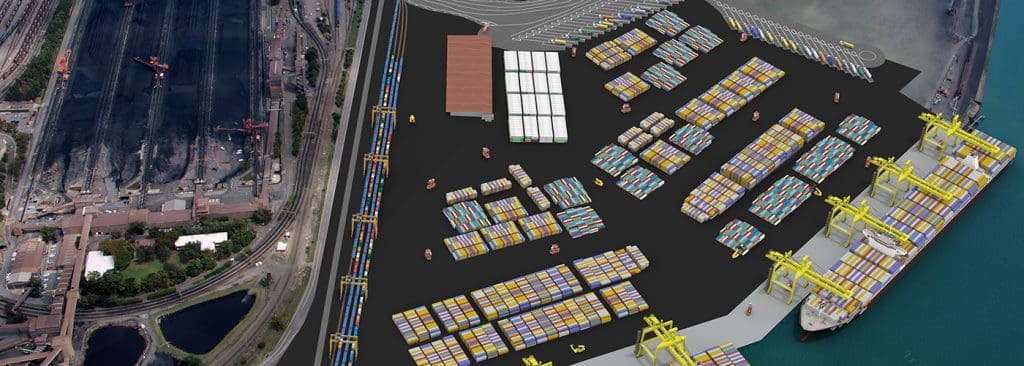
The Port of Newcastle is eyeing substantial growth in container movements, with the proposed facility at Mayfield a key site. Image: Port of Newcastle
THE Australian Competition and Consumer Commission (ACCC) has launched proceedings against NSW Ports Operations Hold Co Pty Ltd for making agreements which it alleges have damaged the viability of the Port of Newcastle’s container terminal.
“We are alleging that making these agreements containing provisions which would effectively compensate Port Kembla and Port Botany if the Port of Newcastle developed a container terminal is anti-competitive and illegal,” ACCC chair Rod Sims said.
The NSW Government privatised Port Botany and Port Kembla in May 2013 and the agreements, known as Port Commitment Deeds, were entered into as part of the privatisation process, for a term of 50 years.
The Botany and Kembla deeds oblige the State of NSW to compensate the operators of Port Botany and Port Kembla if container traffic at the Port of Newcastle exceeds a minimal specified cap.
The ACCC alleges the Botany and Kembla deeds are likely to prevent or hinder the development of a container terminal at the Port of Newcastle, and had the purpose, or was likely to have the effect of, substantially lessening competition.
Half-century issue
Another 50-year deed, signed in 2014 when the Port of Newcastle was privatised, requires it to reimburse the State of NSW for any compensation paid to operators of Port Botany and Port Kembla under their respective port commitment deeds.
The ACCC has alleged that the reimbursement provision in the Port of Newcastle Deed is an anti-competitive consequence of the Botany and Kembla deeds, and has made the development of a container terminal at Newcastle uneconomic.
“The compensation and reimbursement provisions effectively mean that the Port of Newcastle would be financially punished for sending or receiving container cargo above a minimal level if Port Botany and Port Kembla have spare capacity,” Mr Sims said.
“This makes development of a container terminal at the Port of Newcastle uneconomic,” Mr Sims said.
ACCC proceedings are being launched in the Federal Court.
“We are taking legal action to remove a barrier to competition in an important market, the supply of port services, which has significant implications for the cost of goods across the economy, not just in NSW.”
Cost to consumers
Mr Sims said the impact of any lessening of competition was ultimately borne by consumers, and if a competing container terminal cannot be developed at the Port of Newcastle, NSW Ports will remain the only major supplier of port services for container cargo in NSW for 50 years.
“I have long voiced concerns about the short-term thinking of state governments when privatising assets and making decisions primarily to boost sales proceeds, at the expense of creating a long-term competitive market.”
The ACCC is seeking declarations that the compensation provisions in the 2013 Port Commitment Deeds contravene the Competition and Consumer Act 2010 (CCA), injunctions restraining the operators of Port Botany and Port Kembla from seeking compensation under these provisions, pecuniary penalties and costs.
The CCA only applies to the conduct of state governments in certain limited circumstances.
The State of NSW is not currently a party to the ACCC’s proceedings and the ACCC is not seeking orders against the state.
Background
Port Botany Operations is the operator of Port Botany, and Port Kembla Operations is the operator of Port Kembla.
Both are subsidiaries of NSW Ports Operations Hold Co, and all are entities within the NSW Ports group, and parties to the 2013 Port Commitment Deeds.
Port Botany is currently the only port in NSW with dedicated container terminal facilities, and had a container throughput of approximately 2.7 million twenty foot equivalent container units (TEUs) in the year to 30 June, 2018.
Port Kembla has handled approximately 1600 TEUs per year since it was privatised in 2013, while the Port of Newcastle has handled approximately 10,000 TEUs per year since it was privatised in 2014.
Under the 2013 Port Commitment Deeds, it was agreed the State of NSW would pay compensation to the operators of Port Botany and Port Kembla if container traffic at the Port of Newcastle exceeded a cap of 30,000 TEUs per annum, annually adjusted.
The compensation to be paid by the State of New South Wales to the operators of Port Botany and Port Kembla is equivalent to the wharfage fee the port operators would receive if they handled the containers.
Container traffic at the Port of Newcastle has not yet exceeded the specified cap, and therefore no payments have been made by the state under the 2013 Port Commitment Deeds.
Agricultural importance
Newcastle is the Natural Terminal Port for the Namoi Valley, Australia’s largest cotton-growing area, and adjacent regions which are key producers of chickpeas, durum and wheat.
Grain Central’s sources have said the development of Newcastle as a large-scale container port would reduce northern NSW’s dependence on Brisbane and Sydney as the exit points for containerised cotton and grains exports.
The Port of Newcastle has several precincts, with Mayfield, at the site of the former BHP steelworks, being the one seen as most ripe for development in the near term.
Source: ACCC

HAVE YOUR SAY